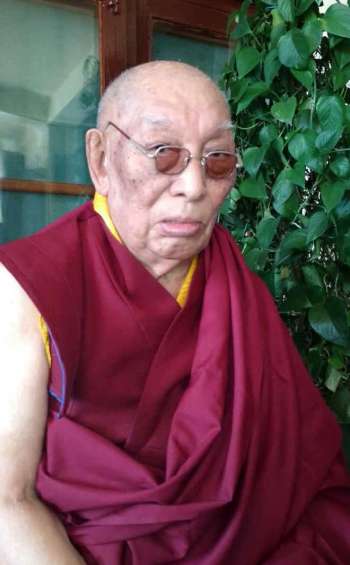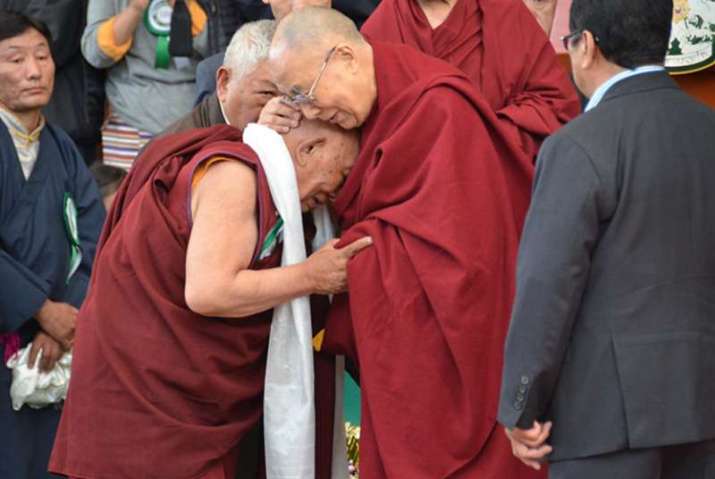Buddhist monk, traditional medicine practitioner, and former personal physician to His Holiness the Dalai Lama, Yeshi Dhonden has closed his medical practice and retired due to old age. Renowned for treating cancer patients at his small clinic in McLeod Ganj, near the Dalai Lama’s official residence in Dharamsala, northern India, Yeshi Dhonden, now 92, stopped seeing patients on 1 April.
The Phayul.com news website reported that Yeshi Dhonden had chosen to retire as his weakening memory was becoming detrimental to his medical practice. His clinic is now only filling prescriptions for existing patients.
A practitioner of traditional Tibetan medicine, Yeshi Dhonden was born on 15 May 1927 in the village of Namro in central Tibet’s in Lhoga District. He entered monastic life when he was six years old and, from the age of 11, studied at Chagpori Tibetan Medical Institute in Lhasa under Khyenrab Norbu, passing his exams with distinction at 20. In 1959, he accompanied the Dalai Lama when he fled Tibet for India, where he was instrumental in the founding of the Tibetan Medical and Astro-science Institute (Men-Tsee Khang) in Dharamsala. He continued to practice in Dharamsala from a private clinic he established in 1969.*

From 1963 to 1980, Yeshi Dhonden served as personal physician to the Dalai Lama, and also held office as both director and principal of Men-Tsee Khang. In January 2018, Yeshi Dhonden was presented with the Padma Shri, India’s fourth-highest civilian award, by Indian president Ram Nath Kovind for his contributions to the field of medicine through traditional Tibetan medicine.
Also known as Sowa-Rigpa, Traditional Tibetan medicine employs a complex approach to diagnosis that incorporates techniques such as pulse analysis and urinalysis, and treats ailments through the application of behavioral and dietary modification, naturally sourced medicines composed of herbs and minerals, and physical therapies such as acupuncture, moxibustion, cupping, and blood-letting. It also emphasizes Buddhist spiritual practices, including meditation and prayer.
During his years as a physician, Dhonden relied primarily on his own senses to ascertain the health of vital organs and diagnose his patients’ ailments. “I don’t go for tests like X-ray and all. I trust myself. I just test the pulse and the urine,” he said, explaining that the color, bubble formations, sediment, and smell of urine samples were all taken into account when making a diagnosis. (France 24)

Although few scientific studies have been carried out to corroborate the efficacy of Dhonden’s traditional treatments, this ancient Tibetan science is growing into a popular form of alternative medicine. In April 2017, both China and India submitted rival applications for Tibetan traditional medicine to be included on a UNESCO list for intangible cultural heritage, and in 2010, the Indian government officially recognized Tibetan medicine as a “science of healing” and included it within the country’s healthcare system.
Yeshi Dhonden’s retirement brings an end to the common sight outside of his small clinic of long queues of patients with worried family members during the early morning hours waiting to secure an appointment chit for a consultation. It commonly took anywhere from days to a month to secure an appointment. Yeshi Dhonden typically saw as many as 50 patients per day at his clinic, with Saturdays off, with people coming from within India’s Tibetan diaspora and all over the world to seek treatment.
The systems of Tibetan medicine combine traditional Tibetan knowledge and treatments, Indian Ayurvedic treatments, and traditional Chinese medicine, and are founded on the belief that the causes of all illnesses are ultimately rooted in the three poisons: ignorance, attachment, and aversion. Based on four key root texts, believed to date to the 12th century, the system classifies thousands of diseases into separate categories that are treated with unique compounds of herbs and minerals mostly sourced in the Himalaya.
* Tibetan Buddhist Monk Offers Drug-free Medical Treatment in Northern India (Buddhistdoor Global)
See more
Cancer specialist Tibetan physician ends practice due to old age (Phayul.com)
Dr Yeshi Dhonden, famous for curing cancer, closes his practice (Tibet Sun)
91-year-old Tibetan monk gets Padma Shri (The Tribune)
Tibetan traditional Dr Yeshi Dhonden awarded Padma Shri award (The Tibet Post)
Tibetan medicine lures patients seeking drug-free cures (France 24)














